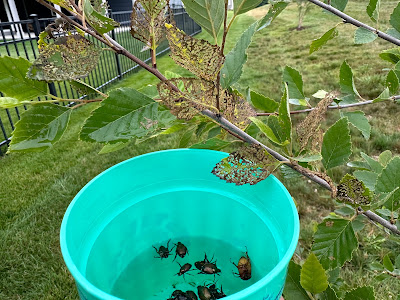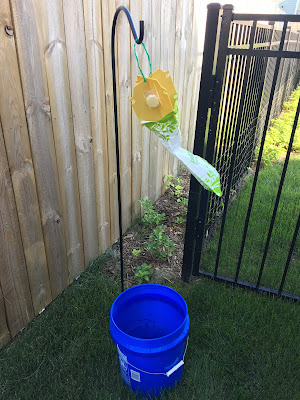It's that time of the year when you start to notice Japanese beetles getting into your yard and eating your trees and shrubs. They are quite beautiful beetles actually with rainbow oil slick looking wing coverings and they are harmless to humans because they don't bite or sting. But they will run rampant in the yard if you are not on the lookout for them. Here are a few tips I've picked up over the years dealing with Japanese beetles.
1. Look for their characteristic "skeletonized" leaves - the beetles eat the fleshy part of the leaf and leave the veins, so if you see skeleton leaves this is a tell tale sign of Japanese beetle damage.
2. Hand picking Japanese beetles from plants can be effective early intervention and prevention - If your yard is not yet overrun and you just notice a few, pick them off the plants and get rid of them. When they feed they release a scent that attracts EVEN MORE Japanese beetles, basically ringing the dinner bell. You don't need to spray insect killer on your whole plant or yard just because you see a few, but remember they are sending out an invisible signal to their friends.
The technique I like to use to get them off the plants is to hold a cup of water under them before I grab them. When they are disturbed their defense mechanism is to drop to the ground, so if you are trying to get them by hand they might slip away. If you hold a cup of water under them first they will drop into the water. They are lousy swimmers and the water will prevent them from flying away as you walk around the yard looking for more. This is also why you see people put buckets of water underneath Japanese beetle traps to catch the ones that fall off.
3. Do not use traps - Remember how I said the Japanese beetles release a scent that attracts other beetles to the feast? The bait used in Japanese beetle traps uses the same scene, essentially attracting EVEN MORE to your yard. I heard a funny expression once that Japanese beetle traps are the perfect gift for your neighbor 5 houses down. If things get really bad I just end up spraying my trees with an insect killer spray.
4. Remember the plants that usually get hit - In my yard I can usually spot them on Buckthorn Fineline, River Birch, and Linden trees. These seem to be their favorite at least where I live. I never see them on boxwoods or roses for example, so I don't bother looking there unless I see "skeletonized" leaves first.



